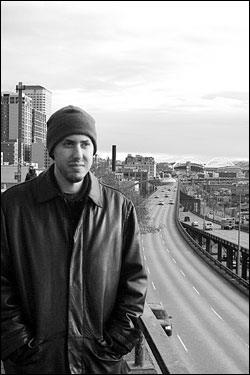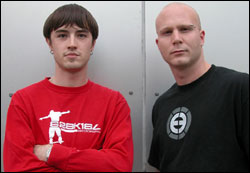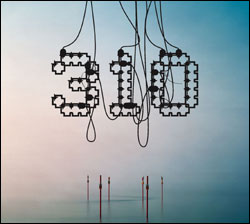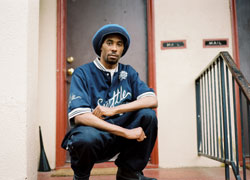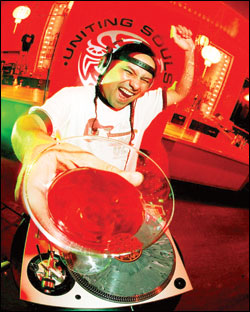Battle-axes clash, dismembered torsos thud against the ground, monstrous demons stalk you with tortured voicesand you thought Bj�seemed such a harmless, delicate thing. Raised on a standard Midwestern diet of corporate glam rock, metal, and grunge, Jeff Samuel didn’t discover electronic music until he heard the Icelandic queen in college. From there it was your typical slippery slope: Bj� the Orb, and other entrance artiststhe deeper he dug, the more entrenched his curiosity became. “I’ve always been into the way things sounded and fascinated by production, whether it’s rock or whatever,” Samuel says. With the discovery of electronic music, this appreciation soon consumed him. DJing followed shortly, with studio building around the corner. These days, it surrounds him night and day.
A sound designer by day, creating nonmusical effects for Microsoft’s warrior game, Mythica, by night Samuel stands as one of the leading faces in the new breed of American techno. The end results of each couldn’t be more different: One shocks with heroic gore, the other coaxes late-night ambitions. Though he keeps a strict separation between his Eastside work and his music, at heart, Samuel’s battleground effects, crackling dubby techno, and shuffling microhouse share similar beginnings.
AFTER FLIRTING WITH a brief jungle affair during that scene’s creative bubble in the mid-’90s, it wasn’t long before the combination of weekend warehouse parties and sessions with the audio archives in the library at Ohio State left Samuel in the grip of hard Detroit techno and the definitive minimalism of Cologne, Germany, label Studio 1. “To me, it’s the most pure form of music that there can be,” he explains. “Most of the time, there’s just one person who’s responsible for everything down to the most finite sound, beginning to end. It’s a direct extension of yourself.”
Though he’s often lumped in with the California glitch crowd (Safety Scissors, Sutekh), in contrast to their deconstructive stance, Samuel says his music is all about simplicity. “I spend the most time trying to find a sound that appeals to me, and everything else falls into place around that,” he explains. “Ease has a lot to do with it. I don’t want to sit there making 8,000 edits on a track.”
This somewhat laissez-faire approach results in the majority of his compositions finishing with only six or seven soundsa starvation diet for mainstream dance floors, but a recipe right in line with the minimal German labels’ tastes. Take “Cwikko,” off last year’s Double Yum EP, released by German label Trapez. This low-lit, late-session killer trails sonar pings and a barely audible two-tone synth off its hiccupping beat, while crisp edits hint at a latent energy waiting to blast through the first crack in the facade. You may not be throwing your hands in the air with the masses at Medusa when the hook drops, but as Samuel proves with the bubbling click-house style of “Digital Self” (Tektite) or the deep-end techno groove on “New Age Mold” (Emoticon, U.K.), the feeling he creates of having to lean in close to those spatial pops and click-drums is often the best way to appreciate their gradually rushing glow.
Rarely a main-room filler, minimal techno too often touches down with the clinical chill of a stethoscope, devoid of all emotion as if there to sound yours out. But Samuel breathes subtle warmth into tracks with his heavy focus on melody. Though he’ll name check fellow Ohioans Dan Curtin, Titonton Duvante, and Morgan Geist of Metro Area as heavy influences, Samuel unashamedly admits his penchant for pop plays a large role. It’s hardly a street-cred-building statement among his steely-eyed peers, but one that separates him from their excursions into blunt-force thumps or detached laptop prowess. Tejada’s backgrounds may crawl deeper, Sutekh may bang harder, and Safety Scissors/MPC may tweak more quirkilywe’ll excuse the latter’s use of vocals for nowbut Samuel is the master at slipping it all to you without distraction. “That’s what I strive for,” he says. “To incorporate melody, Detroit minimalism, and the soul and ‘jack’ of Chicago house, in a very simple fashion.”
SINCE setting up shop in Seattle a year ago, he’s kept a fairly low profile through only a handful of sets after his involvement with Mythica forced him to cancel a European tour. Germany has always seemed to feel the future-focused vibe, from Stockhausen’s experiments to Superpitcher’s current electro-led sound, but techno has faced a constant uphill battle for acceptance at home. With even Detroit having to organize the now 600,000-strong DEMF festival four years ago to let its civic family in on what they created, Samuel feels it’s important to have a life outside the scene.
Having caught only a small pocket of attuned ears locally, he points to ROBO.trash as the site of his best reception thus far. The irony of finding acceptance for the art of futurism in a night of retro revelers is hardly lost on Samuel, and it frustrates him at times. But his admitted distaste for self-promotion and lack of involvement thus far in the local dance scene’s core belies someone content to sit in his studio, releasing tracks to the converted, while others turn ears his way. Lucky for him and us both, Björk has just sold out Pier 62/63 the night before his next set. Hint, hint.
Jeff Samuel plays ROBO.trash at the Alibi Room, 9 p.m. Sat., Aug. 16. $3.
